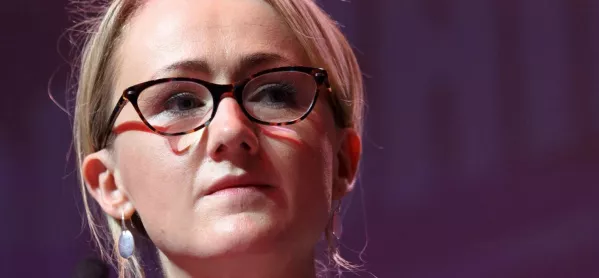Year 10 and 12 pupils should not be expected to catch up with lost GCSE and A-level work when they’re back in school, Labour’s new shadow education secretary has told Tes.
Rebecca Long-Bailey argues that trying to get candidates to learn what they have missed during lockdown will only widen the inequality gap. Instead, she says course content should be cut.
“We need to see a review of the curriculum and a review of future assessments so that [next year’s] GCSE and A levels actually take account of lost work so that pupils aren’t forced to catch up,” she said.
Read: Rebecca Long-Bailey is new shadow education secretary
Long-Bailey writes: ‘My socialist vision for schools’
Keir Starmer writes: Teachers are being badly let down
“If we don’t do that, what we are going to see when we get back to the classroom is those students who are in families where their parents are lucky enough be able to afford tutors, or those who can hothouse, will catch up very quickly.
“And everybody else won’t be able to do that, and then you’ve got a whole generation of pupils who could fall through the cracks and their prospects will be affected and they won’t be able to get jobs in the future.”
She added: “It’s about what our children really need for the future. What do we need to fill those roles in an economy that is going to be on its knees.
“We are going to be in one of the worst recessions that we have ever faced and that’s going to mean a whole generation being skilled up in a way they have never been skilled up before so they can very precisely go for certain jobs”.
Ms Long-Bailey, a Labour leadership contender who took up her new role last month, also called for the suspension of school assessments and accountability measures as well as the scrapping of baseline testing, currently due to be introduced in September.
This would “free up teachers” to focus on the needs of pupils that have come about as a result of the pandemic.
Geoff Barton, general secretary of the Association of School and College Leaders, said: “We think that there will need to be both a focus on helping pupils studying for GCSEs and A levels to catch up, as well as a review of next year’s exams to take into account lost work.
“Pupils will inevitably be at different points in their learning depending on how well they have coped with the need for this to be delivered remotely over an extended period of time.
“Schools and colleges will be in a position of having to decide where to focus extra support. They need time and space in order to carry out this challenging task - which means keeping things simple, not overloading them with extra initiatives, and suspending the normal business of Ofsted inspections and performance tables.
“In addition to that, we doubt it will be possible to carry out exams as normal, but this is a very complex issue, and it will require a great deal of thought on how to make it work in a way that is fair to everyone.”
A Department for Education spokesperson said: “We recognise that students who are studying GCSE, A level or equivalent courses this year but are not due to take exams until 2021, will have experienced disruption to their education.
“We are working with Ofqual and the exam boards to develop our approach to next year’s exams in light of this. More information will be available in due course.”





